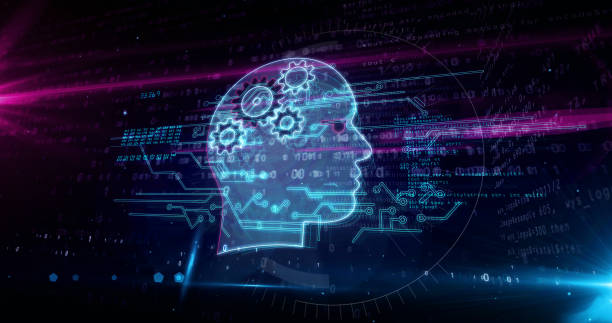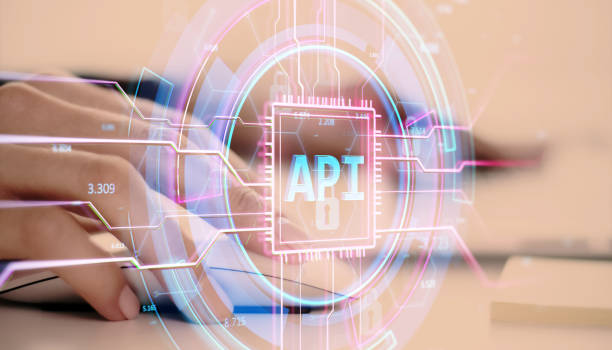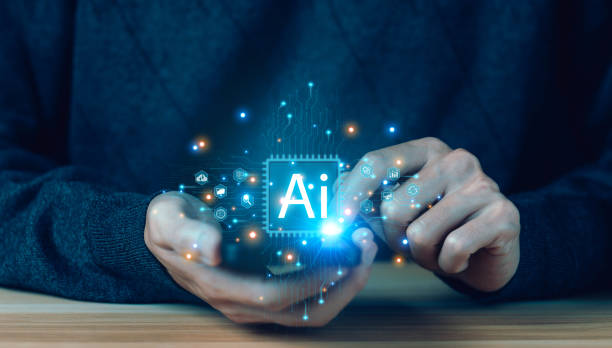What is Artificial Intelligence? Definitions and Basic Concepts
#Artificial_Intelligence (Artificial Intelligence or AI), in short, refers to the ability of a computer system to mimic human cognitive functions such as learning, reasoning, and problem-solving.
This broad field includes various sub-branches, each of which deals with specific aspects of human intelligence.
Artificial intelligence is not just a technology, but a collection of algorithms, models, and approaches that enable machines to perform tasks that previously required human intelligence.
These tasks include pattern recognition, natural language understanding, decision-making, and even creativity.
In fact, artificial intelligence tries to create an intelligent system using various methods that can learn independently, gain experience, and make decisions based on it.
These systems can be used in various fields, including medicine, finance, transportation, and education, and help improve efficiency and accuracy in these fields.
With its ever-increasing development, artificial intelligence plays a more important role in our lives and is expected to create significant transformations in various industries in the near future.
Do you have an online store but your sales are not as expected? Rasaweb solves your problem forever by designing professional online stores!
✅ Significant increase in conversion rate and sales
✅ Unique user experience for your customers
⚡ Click to get free consultation with Rasaweb!
History of Artificial Intelligence from Beginning to Today
The history of #artificial_intelligence dates back to the 1950s, when researchers first considered the idea that machines could be built that were capable of thinking and reasoning.
The Dartmouth Conference in 1956 is recognized as a turning point in this field, where the term “artificial intelligence” was first officially introduced.
In the early decades, the focus was on solving logical and symbolic problems, but with the advancement of technology and the increase in the processing power of computers, new fields such as machine learning and neural networks also came to the fore.
Click here to preview your posts with PRO themes ››
The 1980s and 1990s witnessed ups and downs in this field, but with the emergence of big data and more advanced algorithms, artificial intelligence revived.
Today, we are witnessing widespread applications of artificial intelligence in our daily lives, including voice assistants, recommendation systems, self-driving cars, and industrial robots.
These advances show that artificial intelligence is rapidly becoming a powerful force in the economy and society.
Artificial intelligence (AI) has now become one of the most important research and development areas in the world and is expected to play a much larger role in our lives in the future.
Types of Artificial Intelligence Approaches and Classifications
#Artificial_intelligence can be classified based on different abilities and approaches.
A common classification divides artificial intelligence into two main categories:
- Weak or Narrow AI
- Strong or General AI
Weak artificial intelligence is able to perform a specific task well, such as facial recognition or language translation, but cannot be generalized to other fields.
On the other hand, strong artificial intelligence aims to create a system that is capable of doing anything that a human can do.
Currently, most existing artificial intelligence systems fall into the category of weak artificial intelligence.
Also, artificial intelligence can be classified based on the different approaches used in its development.
Some common approaches include machine learning, neural networks, natural language processing, and expert systems.
Each of these approaches has its own advantages and disadvantages and is suitable for solving different problems.
Artificial intelligence (AI) with the diversity of approaches and classifications, provides extensive possibilities for solving complex problems and improving efficiency in various industries.
| Type of Artificial Intelligence | Description |
|---|---|
| Weak AI (Narrow AI) | Focused on performing a specific task |
| Strong AI (General AI) | Ability to do anything that a human does |
Machine Learning and its Role in Artificial Intelligence
Machine Learning is one of the most important sub-branches of #artificial_intelligence that allows machines to learn from data without explicit programming.
In fact, instead of giving the machine specific instructions to perform a task, machine learning provides algorithms that allow the machine to identify patterns and relationships in the data and make decisions based on them.
Machine learning is used in various fields, including image recognition, natural language processing, and predicting customer behavior.
There are different types of machine learning algorithms, including supervised learning, unsupervised learning, and reinforcement learning.
In supervised learning, the machine is trained using labeled data, while in unsupervised learning, the machine must find patterns independently in the data.
Reinforcement learning also allows the machine to learn through trial and error and adjust its decisions based on environmental feedback.
Machine learning plays a very important role in the development of artificial intelligence by providing powerful tools for data analysis and behavior prediction.
Did you know that 94% of users’ first impressions of a business are related to its website design? With professional corporate website design by **Rasaweb**, turn this first impression into an opportunity for growth.
✅ Attract more customers and increase sales
✅ Create credibility and trust in the eyes of the audience⚡ Get free website design consultation!
Practical Applications of Artificial Intelligence in Various Industries
#Artificial_intelligence has extensive applications in various industries and helps to improve efficiency, reduce costs and increase accuracy.
In the field of medicine, artificial intelligence can be used to diagnose diseases, design new drugs, and provide personalized healthcare.
In the financial industry, artificial intelligence can be used to detect fraud, manage risk, and provide automated financial services to customers.
Also, in the field of transportation, artificial intelligence can be used to develop self-driving cars, optimize transportation routes and reduce traffic.
In addition, artificial intelligence has many applications in the manufacturing industry, agriculture, education, and many other fields.
For example, in the manufacturing industry, artificial intelligence can be used for quality control, predicting equipment failure, and optimizing production processes.
In agriculture, artificial intelligence can be used to manage water resources, detect pests and diseases, and increase crop productivity.
Given the diversity of applications, artificial intelligence (AI) has become a key technology for transforming various industries and is expected to play a much more important role in the global economy in the future.
Challenges and Limitations of Artificial Intelligence
Despite significant advances in the field of #artificial_intelligence, there are still important challenges and limitations that need to be addressed.
One of the most important challenges is the need for large and high-quality data to train artificial intelligence models.
Without sufficient and appropriate data, the performance of these models may be poor and not provide accurate results.
Also, the interpretability of artificial intelligence models is an important challenge.
Many complex models, such as deep neural networks, act like black boxes, and it is difficult to understand how they reached a particular result.
In addition, ethical and social issues related to artificial intelligence must also be considered.
Misuse of artificial intelligence can lead to discrimination, privacy violations, and job losses.
Therefore, it is necessary to develop appropriate laws and regulations to control and monitor the development and use of artificial intelligence.
Artificial intelligence (AI), despite its high potential, requires attention to challenges and limitations in order to fully benefit from its advantages and prevent its negative consequences.
Future of Artificial Intelligence Predictions and Emerging Trends
The future of #artificial_intelligence is full of new opportunities and challenges.
It is predicted that in the coming years, artificial intelligence will be increasingly integrated into our daily lives and create significant transformations in various industries.
One of the emerging trends is the development of Explainable AI or XAI, which aims to increase the transparency and interpretability of artificial intelligence models.
By using XAI, a better understanding of how these models work can be achieved and more trust can be placed in them.
The future of artificial intelligence.
Also, the development of Artificial General Intelligence or AGI is another ambitious goal in this field.
AGI seeks to create a system that is capable of doing anything that a human can do and even surpass humans.
However, achieving AGI requires significant advances in algorithms, hardware, and our understanding of intelligence.
Artificial intelligence (AI) with its ever-increasing advances, has a high potential to change the world and is expected to play a much more important role in our lives in the future.
| Emerging Trend | Description |
|---|---|
| Explainable AI (XAI) | Increasing transparency and interpretability of models |
| Artificial General Intelligence (AGI) | Creating a system with human abilities |
Artificial Intelligence and its Impact on the Labor Market
#Artificial_intelligence has a significant impact on the labor market and creates new opportunities and challenges.
On the one hand, artificial intelligence can increase productivity and reduce costs by automating repetitive and tedious tasks.
This can lead to a decrease in demand for some jobs, especially jobs that require low skills.
On the other hand, artificial intelligence can create new job opportunities in areas related to the development, implementation, and maintenance of artificial intelligence systems.
Artificial intelligence and the labor market
To adapt to the changes caused by artificial intelligence, it is necessary for people to learn new skills and prepare themselves for future jobs.
Skills related to data analysis, programming, artificial intelligence engineering, and artificial intelligence project management will be in high demand in the future.
Also, soft skills such as critical thinking, problem-solving, and creativity will become more important, as these skills are not replaceable by machines.
Artificial intelligence (AI) by creating changes in the labor market, requires planning and preparation to benefit from its opportunities and prevent its negative consequences.
Are you annoyed by losing customers who have visited your site to buy?
Rasaweb is your specialized solution for having a successful online store.
✅ Significant increase in your online sales
✅ Creating trust and professional branding with customers⚡ Get free consultation from Rasaweb experts!
Ethical Issues Related to Artificial Intelligence
#Artificial_intelligence raises important ethical issues that need to be addressed.
One of these issues is algorithmic bias.
If the data used to train artificial intelligence models is biased, this bias is also reflected in the models and can lead to discriminatory decision-making.
For example, a facial recognition system may perform poorly for people with dark skin tones if it has not been trained with enough data from these people.
Another issue that needs to be addressed is privacy.
Artificial intelligence systems often require large amounts of personal data to function effectively.
The collection and use of this data must be carried out in compliance with privacy laws and regulations, and individuals must have full control over their data.
Also, the use of artificial intelligence in sensitive decisions such as hiring, lending, and law enforcement should be done with care and caution to prevent the violation of people’s rights.
Artificial intelligence (AI) by raising ethical issues, requires attention to values and ethical principles in order to be used responsibly.
How to Learn Artificial Intelligence Resources and Educational Paths
Learning #artificial_intelligence can be an exciting and opportunity-filled journey.
To get started, you can use online educational resources such as Udemy, Coursera, and edX training courses.
These courses comprehensively teach the basic concepts of artificial intelligence, machine learning, and neural networks.
You can also use educational books and scientific articles related to artificial intelligence to deepen your knowledge.
In addition, participating in practical projects and working on real problems can help you strengthen your skills.
You can participate in open-source artificial intelligence projects or create your own personal projects.
Also, participating in artificial intelligence competitions such as Kaggle can help you compete with other artificial intelligence enthusiasts and learn from their experiences.
Artificial intelligence (AI) by providing diverse resources and educational paths, provides the possibility of learning and progress for all interested people.
With effort and perseverance, you can become an artificial intelligence expert and play an important role in this innovative and thriving field.
FAQ
| Question | Answer |
|---|---|
| What is Artificial Intelligence? | It is the simulation of human intelligence in programmed machines to think like humans and mimic their actions. |
| What are the main branches of Artificial Intelligence? | Includes Machine Learning, Deep Learning, Natural Language Processing, Computer Vision, and Robotics. |
| What is Machine Learning? | It is a branch of AI that focuses on enabling systems to learn from data and identify patterns without explicit programming. |
| Mention examples of AI applications in our daily lives. | Voice assistants (such as Siri and Alexa), recommendation systems in Netflix and Amazon, self-driving cars, and facial recognition software. |
| What is Deep Learning? | It is a subset of machine learning that uses artificial neural networks with multiple (deep) layers to process large amounts of data. |
| What is Natural Language Processing (NLP)? | It is a branch of AI that focuses on enabling computers to understand, interpret, and generate human language. |
| What are some of the ethical concerns regarding AI? | Includes bias in data, privacy, job loss, and responsibility in case of errors. |
| What are the main benefits of AI? | Increasing efficiency, improving decision making, automating repetitive tasks, and discovering complex patterns in data. |
| How is AI used in the healthcare field? | In diagnosing diseases, discovering drugs, analyzing medical images, and providing personalized care to patients. |
| How do you see the future of AI? | It is expected to continue to evolve at a rapid pace, impacting all aspects of human life, from industry to education and entertainment. |
And other services of Rasa Web Advertising Agency in the field of advertising
Intelligent website development: An effective tool for online growth with the help of marketing automation.
Intelligent Sales Automation: A creative platform to improve website traffic growth by managing Google Ads.
Intelligent Sales Automation: A new service to increase click-through rate through marketing automation.
Intelligent Digital Advertising: A new service to increase digital branding through Google Ads management.
Intelligent SEO: Transform your click-through rate with the help of attractive user interface design.
And more than hundreds of other services in the field of internet advertising, advertising consulting and organizational solutions
Internet Advertising | Advertising Strategy | Advertorial
Resources
Applications of Artificial Intelligence in Marketing and Data Analysis
,Artificial Intelligence in Business Intelligence
,How Does Artificial Intelligence Help in Financial Risk Analysis?
,What is Artificial Intelligence?
“`html
? Transform your business in the online world with Rasa Web Digital Marketing Agency; from fast website design to comprehensive SEO strategies.
“`
📍 Tehran, Mirdamad Street, next to Central Bank, South Kazerun Alley, Ramin Alley No. 6
“`














